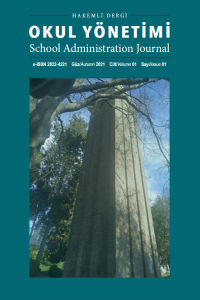Abstract
Bu çalışmada okul yöneticilerinin görüşlerine göre başarılı okul standartları belirlenmiştir. Araştırma sonucunda, okul müdürlerinin görüşlerine göre başarılı okulun unsurları, müfredattan
ziyade öğrencilerin yetenek, beceri ve meraklarını tatmin edecek şekilde dizayn edilmesi yönünde olmuştur. Yönetimsel olarak, iş birliğine açık, çözüm odaklı ve farklı programları eş zamanlı
yönetebilecek derecede öğretim liderliği yapabilme kabiliyetine sahip olması gerektiği belirtilmiştir. Öğretmenin ise sadece alan bilgisiyle değil, mesleki becerilerinin de ön planda olması istenmektedir. Öğretmenlerin iletişime açık, öğrenmeyi öğreten, öğrenmenin aktif ayrıca tutum ve değerleri ile öğrencilerine örnek kişiler olması beklenmektedir. Öğrencilerin, disiplinli ve hedef odaklı olduğu kadar, kendi yeteneklerinin ve becerilerinin keşfedilmesini talep eden kişiler olmalıdır
Abstract
In this study, successful school standards were determined according to the opinions of
school administrators. As a result of the research, according to the opinions of the school principals,
the elements of the successful school were designed to satisfy the talents, skills and curiosity of
the students rather than the curriculum. Administratively, it has been stated that he should be
open to cooperation, solution-oriented, and have the ability to lead teaching at a level that can
simultaneously manage different programs. The teacher, on the other hand, is required to be at the
forefront not only of his field knowledge but also of his professional skills. Teachers are expected to
be open to communication, teaching learning, active partners of learning, and role models for their
students with their attitudes and values. Students should be disciplined and goal-oriented, as well
as demanding the discovery of their own talents and abilities.
Keywords
Details
| Primary Language | Turkish |
|---|---|
| Subjects | Other Fields of Education |
| Journal Section | Research Articles |
| Authors | |
| Publication Date | December 31, 2021 |
| Submission Date | October 15, 2021 |
| Published in Issue | Year 2021 Volume: 1 Issue: 1 |


